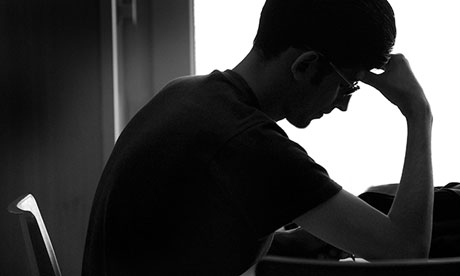
Andy was 38 when he killed himself. He was a friend of my mum's who had been staying with us over Christmas. We had played Jenga and watched The Simpsons. I liked Andy. When I went to medical school open days he would let me stay in his tiny flat in central London. He said location, location, location was far more important than size, and as it was only him there, he could manage. Less to clean, too. Andy died in his postage stamp of a kitchen after taking all the pills he could find. I was 16.
It's men you need to worry about. They don't write letters, they don't tell anyone. They quietly find a noose or a knife or a gun and just get on with it. That's how it was with Andy.
"Your mum needs to tell you something very important," Dad said. It was after PE on Thursday and my mobile had six missed calls, all from my parents. I didn't know what I was supposed to feel; it took a while until I finally started crying, in the car, a week later. Andy was buried in the autumn, in the best leather jacket I have ever seen.
I took up the offer of a junior doctor job in psychiatry last year. And now I have seen what happens to people like Andy when they survive a suicide attempt. We counsel and encourage and rehabilitate and sometimes people say they feel like they can live again. Sometimes they leave hospital and kill themselves.
10 September is World Suicide Prevention Day. There will be messages of solidarity from the government, but the truth is that there is nowhere near enough money in the country's mental health services. Apart from a few gems services are vastly underfunded when you look at what is really needed.
When I worked on the wards I spoke to people who wanted to die. A lot of them had awful lives. They lived on benefits, and they had to leave their homes because of new taxes on spare bedrooms. Or they had their DLA cut because the government said things have changed and they should be at work, despite their disability. They were desperate, hopeless, and afraid. The state didn't care, but the NHS still does. We have to pick up the pieces.
"We all know, in our hearts, that as long as there is deep poverty living systematically side by side with great riches, we all remain the poorer for it." David Cameron said this in 2009, before announcing cuts to the benefits of the most vulnerable people in society. With welfare, the choice is more complex than compassion or condemnation. People are not either strivers or scroungers.
Nearly half of those struggling with debt consider ending their life. You can't just ignore the sharp increases in suicide rates that come with every economic crash by saying "We're all in this together." We're clearly not. I have seen the harm that has already been caused: bad policy costs lives.
Names and details have been changed to protect identities of those involved
The fee for this blogpost has been donated to MIND, the mental health charity

